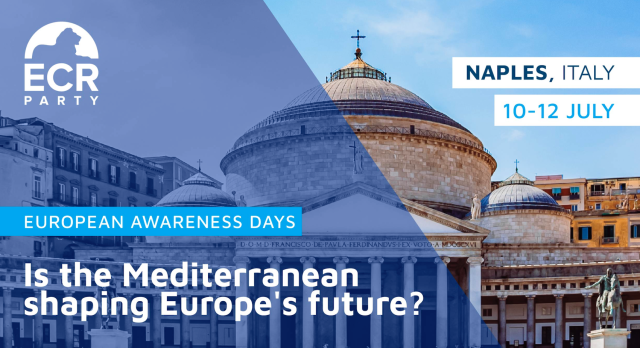
At the ECR Party panel in Naples, leaders called for stronger European sovereignty, investment in defense, and a clear roadmap for Ukraine’s reconstruction and integration — a defining challenge for the continent’s future.
As the war in Ukraine grinds on, casting its long shadow over Eastern Europe and beyond, the ECR Party’s panel “Europe and the Future of Ukraine: Security, Sovereignty, and Reconstruction”, held in Naples on July 12, 2025, offered a rare, candid moment of political clarity. Leaders from across Europe gathered to make one thing unequivocally clear: Ukraine’s future is Europe’s test, and success will require more than just solidarity — it demands strategic action, deep reform, and unwavering commitment.
Italian Deputy Foreign Minister Edmondo Cirielli opened the panel by referencing the just-concluded Ukraine Recovery Conference in Rome, attended by representatives from over 70 countries. Despite the ongoing missile strikes and drone attacks that plague Ukraine, the message from Rome — and echoed in Naples — was unmistakable: reconstruction must begin even before peace is declared. “We must imagine the future of Ukraine now,” Cirielli urged, describing both the tragic urgency of the moment and the profound opportunity it offers — not just for Ukraine, but for Europe and the broader West.
Cirielli emphasized that the reconstruction effort, already attracting support from countries like the UAE, Canada, Australia, and Japan, represents an extraordinary chance for Western — and especially Italian — businesses to contribute to and benefit from Ukraine’s recovery. Beyond economics, however, he stressed the symbolic power of rebuilding: it is an act of defiance against authoritarianism and a declaration of democratic endurance.
This theme of sovereignty and security carried through the speech of Antonio Giordano, Secretary General of the ECR Party. For Giordano, defending Ukraine is not merely an act of altruism — it’s a strategic imperative. “Defence is the foundation of sovereignty and prosperity,” he insisted, rejecting the notion that military investment is at odds with social progress. Instead, he pointed to how defence innovation has historically fuelled civil advancements, from cybersecurity to Formula 1 technologies.
The European Union, Giordano argued, must coordinate its fragmented defence systems and build interoperability, drawing lessons from Ukraine’s battlefield ingenuity — particularly in drone warfare and digital resilience. The war has revealed the steep costs of delay and division, he warned, and Europe must respond with integration, investment, and institutional ambition.
Former Croatian President Kolinda Grabar-Kitarović echoed this sentiment, offering a vision of Ukraine that parallels her own country’s post-war trajectory. She called on Europe to act not only as a financial donor but as a strategic power, capable of providing deterrence in conventional, cyber, and space domains. “Ukraine’s defence is Europe’s defence,” she stated firmly. “The reconstruction of Bucha and Irpin is not just symbolic — it’s the beginning of Ukraine’s rebirth.”
Yet the panel didn’t shy away from the darker aspects of the war. Beata Jurik, Vice-chair of the Slovak Committee for European Affairs, delivered a passionate plea for justice — not just bricks and mortar. She condemned the abduction and forced re-education of Ukrainian children by Russian forces as a grotesque form of identity erasure. “Europe must act decisively to bring them home,” she urged, backing initiatives like “Bring Kids Back” and calling for a special tribunal to prosecute Russian aggression.
Lithuanian MP Zygimantas Pavilionis framed the war in stark geopolitical terms. For Pavilionis, Ukraine’s integration into the EU and NATO is not just a political goal — it is the only way to undermine the Russian regime and deny it legitimacy. “Transforming Ukraine is the key to transforming Russia,” he argued, casting Ukraine as a frontline of global democracy. He warned that failure to support Ukraine would embolden authoritarian regimes from Moscow to Beijing.
The panel also delved into the complex transatlantic dynamics shaped by former U.S. President Donald Trump’s policies. Giordano described Trump as a strategic negotiator focused on national interest — a reminder, he said, that Europe cannot rely indefinitely on American defence largesse. Both Kitarović and Cirielli acknowledged that while Trump had questioned European contributions to NATO, he also recognized the geopolitical importance of initiatives like the Three Seas Initiative and the energy independence they promise.
Cirielli made the case for a stronger European military identity, suggesting that creating a European army could streamline defence spending, boost industrial innovation, and preserve democratic freedoms. He argued that the U.S., while still a key ally, now seeks partnership — not paternalism — and that Europe must rise to the challenge with its own capabilities.
In closing, Giordano moved beyond geopolitics, reflecting on the values underpinning Europe’s unity. “Europe is not just the product of treaties,” he said, critiquing bureaucracy in favour of genuine political and cultural fraternity. The future of Europe, he suggested, lies in people — in their shared traditions, liberties, and families.
Cirielli concluded by thanking the participants, calling them “free men who believe in their history, culture, and identity.” In a moment of warmth and solemnity, he reminded the audience that Europe is not merely a political union — it is a civilization worth defending.
As Ukraine fights not only for its land but for its place in the European family, the Naples panel underscored a difficult but inescapable truth: Europe must become what it pretends to be — a strategic, sovereign, and united force. If it fails, the price will not only be paid in Kyiv, but in the very heart of the continent itself.



 Subscribe
Subscribe